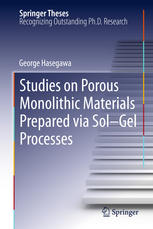

Most ebook files are in PDF format, so you can easily read them using various software such as Foxit Reader or directly on the Google Chrome browser.
Some ebook files are released by publishers in other formats such as .awz, .mobi, .epub, .fb2, etc. You may need to install specific software to read these formats on mobile/PC, such as Calibre.
Please read the tutorial at this link: https://ebookbell.com/faq
We offer FREE conversion to the popular formats you request; however, this may take some time. Therefore, right after payment, please email us, and we will try to provide the service as quickly as possible.
For some exceptional file formats or broken links (if any), please refrain from opening any disputes. Instead, email us first, and we will try to assist within a maximum of 6 hours.
EbookBell Team

4.4
92 reviewsThis thesis focuses on porous monolithic materials that are not in the forms of particles, fibers, or films. In particular, the synthetic strategy of porous monolithic materials via the sol–gel method accompanied by phase separation, which is characterized as the non-templating method for tailoring well-defined macropores, is described from the basics to actual synthesis. Porous materials are attracting more and more attention in various fields such as electronics, energy storage, catalysis, sensing, adsorbents, biomedical science, and separation science. To date, many efforts have been made to synthesize porous materials in various chemical compositions—organics, inorganics including metals, glasses and ceramics, and organic-inorganic hybrids. Also demonstrated in this thesis are the potential applications of synthesized porous monolithic materials to separation media as well as to electrodes for electric double-layer capacitors (EDLCs) and Li-ion batteries (LIBs). This work is ideal for graduate students in materials science and is also useful to engineers or scientists seeking basic knowledge of porous monolithic materials.